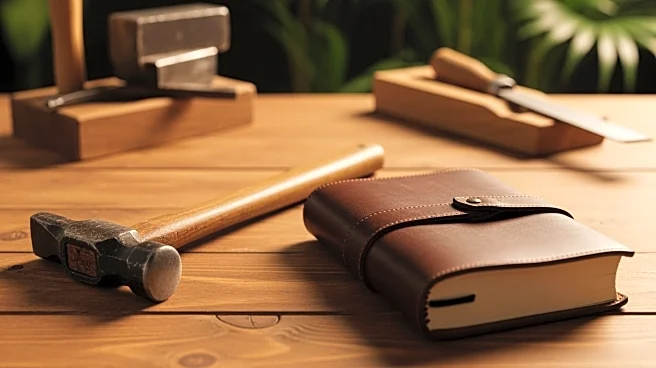What's Happening?
Nick Offerman, known for his role as Ron Swanson in 'Parks and Recreation,' recently shared insights into his personal philosophy and career during an interview on NPR's 'Wild Card' with Rachel Martin.
Offerman, who won an Emmy for his role in HBO's 'The Last of Us,' discussed his deep affection for woodworking, his love for naturalist writer Wendell Berry, and his latest book, 'Little Woodchucks: Offerman Woodshop's Guide to Tools and Tomfoolery.' He expressed a sense of nostalgia for values like decency and fidelity, which he believes are sometimes seen as outdated. Offerman's brand as a carnivore and his fear of love were also topics of conversation, highlighting his multifaceted personality and interests.
Why It's Important?
Nick Offerman's reflections on traditional values and personal satisfaction resonate with many who seek authenticity in a rapidly changing world. His emphasis on woodworking and naturalism offers a counter-narrative to the digital and fast-paced lifestyle prevalent today. Offerman's success in both acting and writing demonstrates the potential for individuals to cultivate diverse interests and skills, contributing to a richer cultural landscape. His views may inspire others to explore hobbies that connect them with nature and craftsmanship, promoting a balanced and fulfilling lifestyle.
What's Next?
Offerman's continued exploration of woodworking and writing suggests he will remain a prominent figure in promoting traditional crafts and values. His book 'Little Woodchucks' aims to engage parents and children in woodworking, potentially fostering a new generation of enthusiasts. As Offerman shares his philosophy through various media, he may influence public discourse on the importance of maintaining cultural heritage and personal satisfaction in modern society.
Beyond the Headlines
Offerman's advocacy for values like decency and fidelity raises questions about the cultural shifts in contemporary society. His approach to life and work challenges the notion that success is solely defined by technological advancement and material wealth. By embracing simplicity and craftsmanship, Offerman encourages a reevaluation of what constitutes a meaningful life, potentially impacting cultural and ethical discussions.









